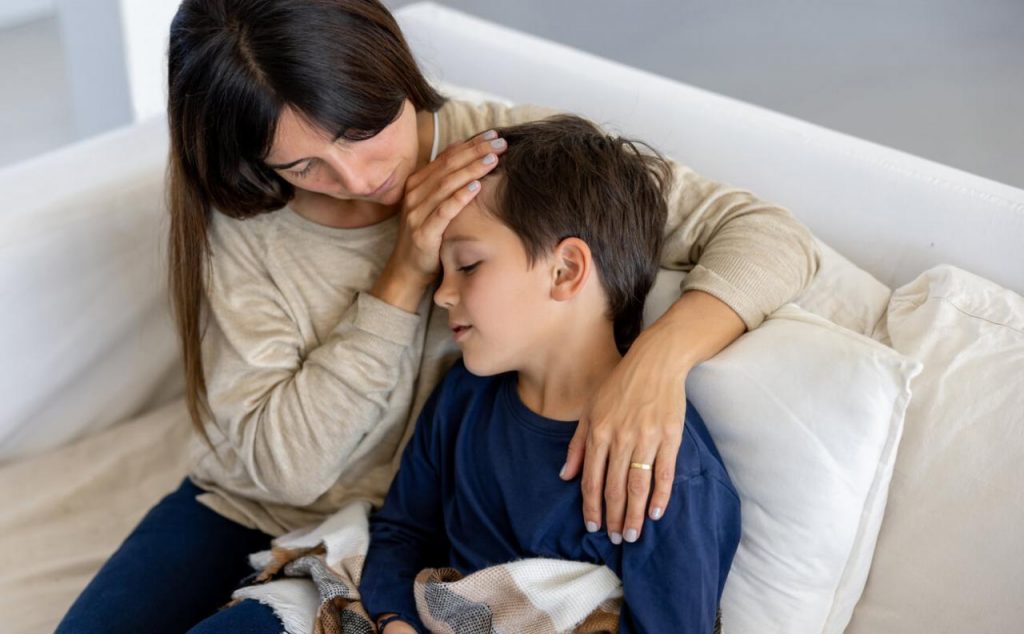As parents, navigating the world of childhood illnesses can feel like being lost at sea without a compass. From pesky ear infections to relentless stomach bugs, the minefield of common ailments can be overwhelming to even the most seasoned caretakers. But fear not, dear reader, for in this article, we will equip you with the knowledge and tools needed to confidently steer your child through the stormy waters of sickness. So grab a life jacket, buckle up, and let’s set sail on this journey of how to handle common childhood illnesses with grace and ease.

Recognizing Symptoms of Common Childhood Illnesses
It’s important for parents to be able to recognize the symptoms of common childhood illnesses in order to provide the best care for their little ones. By being aware of these signs, you can take appropriate action and help your child feel better faster. Here are some tips on how to handle common childhood illnesses:
- Fever: A fever is often a sign that the body is fighting off an infection. Monitor your child’s temperature and consult a doctor if it rises above a certain level.
- Cough: A persistent cough can be a symptom of a cold or the flu. Make sure your child gets plenty of rest and drinks fluids to help soothe their throat.
- Runny nose: A runny nose is usually a sign of a common cold. Use a saline nasal spray to help clear out mucus and provide relief.
Remember to always consult with your child’s pediatrician if you have any concerns about their health. With the right care and attention, your little one will be back to their playful self in no time!
Importance of Prompt Medical Attention for Children
It is crucial for parents to recognize the importance of seeking prompt medical attention for children when they are unwell. Childhood illnesses can escalate quickly, and early intervention can make a significant difference in the outcome. Here are some key reasons why prompt medical attention is essential for children:
- Early Diagnosis: Timely medical attention can lead to early diagnosis of illnesses, helping healthcare providers to start appropriate treatment quickly.
- Prevention of Complications: Prompt medical care can help prevent minor illnesses from developing into more serious conditions that could require hospitalization.
- Reduced Suffering: Seeking medical attention promptly can relieve a child’s discomfort sooner and reduce their overall suffering.
Therefore, parents should not hesitate to contact their child’s healthcare provider or seek emergency care when needed. By prioritizing prompt medical attention, parents can ensure the well-being and speedy recovery of their children.
Key Strategies for Managing Illnesses at Home
One of the is to prevent the spread of germs. Teach your child to wash their hands frequently with soap and water for at least 20 seconds. Make sure they cover their mouth and nose with a tissue or their elbow when they cough or sneeze. Encourage them to avoid sharing cups, utensils, or towels with others to reduce the risk of spreading germs.
Providing Comfort and Relief
When your child is feeling under the weather, it’s important to provide comfort and relief. Make sure they get plenty of rest and stay hydrated by offering them water, clear fluids, or electrolyte drinks. Use a cool-mist humidifier in their room to help ease congestion and soothe a sore throat. Offer them comforting foods like soup or popsicles to help alleviate symptoms.
Monitoring Symptoms
Keep a close eye on your child’s symptoms and monitor their fever, if present, with a thermometer. If their symptoms worsen or they develop new symptoms, contact their healthcare provider for further guidance. Keep track of any medications they are taking and follow the recommended dosages. Be sure to follow up with their doctor if their symptoms persist or if you have any concerns about their illness.
Preventing Spread of Illnesses in the Household
When it comes to preventing the spread of illnesses in the household, it’s essential to be prepared and proactive. Here are some practical tips to help you navigate through common childhood illnesses:
- Practice good hygiene: Encourage regular handwashing with soap and water for at least 20 seconds. Teach your child to cover their mouth and nose when sneezing or coughing.
- Keep a clean environment: Regularly clean and disinfect frequently touched surfaces such as doorknobs, toys, and electronic devices. This can help reduce the spread of germs within the household.
- Monitor symptoms: Keep an eye on your child’s health and be on the lookout for symptoms of common childhood illnesses such as fever, cough, runny nose, and stomachache. Consult with a healthcare provider if necessary.
In conclusion, being prepared and informed on how to handle common childhood illnesses can help alleviate stress and ensure your child receives the care they need in a timely manner. Remember, always consult with a healthcare professional if you are uncertain about how to treat your child’s symptoms. By staying calm and attentive, you can navigate through these common childhood illnesses with confidence and care. Here’s to a healthier and happier journey ahead for you and your little one.

